Reviews
Fritz Lang
USA, 1952
Credits
Review by Leo Goldsmith
Posted on 04 August 2009
Source TCM Broadcast
Categories Women of the West
Listen! Listen well…
The voice of William Lee, operating in the capacity of a folksy Greek chorus by singing “The Legend of Chuck-a-Luck,” commands our attention at the outset of Fritz Lang’s Rancho Notorious. And while what follows, from a superficial glance, seems like a fairly conventional take on those themes loudly and lengthily expounded upon by the film’s theme song - namely “HATE, MURDER, and REVENGE” - Lang’s film is nonetheless invested with his particular sense of myth and fantasy, a backlot bacchanal of ancient proportions and B-Western underpinnings, sung to the Muse that is Marlene Dietrich.
What seems to have attracted Lang to the project - quite a conventional one, even by the standards of some of his 1950s Hollywood films - was this narrative device, the baritone balladeer’s chorus, which conveys the simplicity and classical structure the Western genre offered. Though Lang only made a couple of other Westerns (The Return of Frank James and Western Union, made back-to-back in 1940 and ‘41), he seemed to find in them the same abstracted, archetypal neatness as the exotic novels of Karl May, the thriller stories that spawned The Spiders (and many other films), and even Die Nibelungen. He later told an interviewer:
I like Westerns. They have an ethic that is very simple and very necessary. It is an ethic which one doesn’t see now because critics are too sophisticated. They want to ignore that it is necessary to really love a woman and to fight for her.
That the woman in question was Dietrich, fellow countrywoman of Fritz Lang and the erstwhile muse of Josef Von Sternberg, makes Lang’s job all the more interesting. By 1952, Dietrich was over twenty years into her film career, a star fixed in the Hollywood firmament with an archetype and a mythology of her own in tow.
But first, a plot and a hilariously corny opening scene to introduce it. The Wheels of Fate turn on the Wyomin’ town sung of in the theme song, specifically the local general store and assayer, where ingenuous Vern Hassey coos at his fiancée about the ranch they hope to buy some day. He tells her that the name she has suggested - Lost Cloud Ranch - is “Pretty as you,” and then gifts her with a broach “from Paris in France, the man said.” Painted in this decorous scene is the suburban western dream - a ranch of one’s own to raise critters on - and, then, the most horrible child-actor imaginable walks in to interrupt their lovemaking, thus completing the image of banal 1950s American sentimentality. But Lang gives us this maudlin introduction only to immediately brutalize us with a violent intrusion, a scene of robbery and grotesque sexual murder, complete with lip-licking villain, blood-curdling cries of “No!” from the ravaged victim, and the doctor’s crude verdict: “She wasn’t spared… anything.” HATE, MURDER, and REVENGE, here we come.
Ostensibly the protagonist of the film, Vern is played by Arthur Kennedy, an actor of folksy dimensions (and range) with a slightly wicked look and nervy energy about him that work well here, as in the role of another corrupted square in Nick Ray’s The Lusty Men. There’s an interesting superficiality about Kennedy that seems to tarnish easily—he can go from leer to sneer and back quicker than anybody. Fond of this kind of moral bipolarity, Lang exploits this dualism in the film’s tone, with its alternating high artifice and occasional bursts of savagery. In The Films of Fritz Lang: Allegories of Vision and Modernity, his essential and big book on the director, Tom Gunning notes:
the techniques of illusionism so important to the 50s, not only colour and wide-screen, but also location shooting and big-budget reconstructions, only emphasise how unreal Lang’s films in this vein look. Lang insisted on the constructedness and artificiality of his archetypal fantasy worlds, and did not try to endow them either with emotional immediacy or even believability.
There is a distinct hokeyness about Lang’s vision of the West - pancake-flat sets in a generic studio-backlot Western town; giant, abstract crab-colored boulders made out of papier-m&avir;ché, brazenly unnaturalistic stage-lighting - but it’s the ardent phoneyness of mythology. Nonetheless, there are a couple of moments of striking emotion, however stylized, in Rancho Notorious, like the brief scene in which Vern instigates a punch-up in a barber shop, shot with an unusual handheld camera.
Vern’s crusade to track down the rapist and murderer of his love pushes the film (and the usually somewhat milquetoast Kennedy) into unusually dark territory for such a docile-looking product. Vern is a conniving and sinister hero, willing to fake friendliness and even romance to insinuate himself deep into the milieu of outlaws and loose women in order to achieve his ends. This is how he hears of the “Chuck-a-Luck” (Fritz Lang’s own title for the film before Howard Hughes made him change it for something equally nonsensical), the desperado safe-house run by former bordello denizen, La Dietrich. Her character - the weirdly named Altar Keane - is a strange, revisionist take on her usual persona, a relocation of Von Sternberg’s mercurial, indefatigable anti-heroine ultra-vixen to a West slightly less Wild than it used to be. Appropriately, Altar is introduced in flashback, conducting a Weimar-style bacchanal in a gold-rush saloon run by William Frawley (Fred Mertz on I Love Lucy; here, he’s “Baldy”, a pimp and casino-king, who tries to screw Altar Keane out of her money). Cultural translation is definitely underway when Dietrich sings in her woozy German monotone the old adultery ballad “Black Jack Davy,” popularized as frontier lore by the Carter Family (among many others). With this first sight of Marlene riding like a jockey on a man’s back in a bout of ecstatic, tawdry whoring, we’re experiencing a kind of compound nostalgia for various bygone eras of Hollywood and Germany and the American Frontier, however fictional these eras might be.
Throughout the film, Lang demonstrates this preoccupation with history and lore, particularly through the sexual history and mythology of Altar Keane. Vern tracks her down by following her legends, and indeed Altar’s role as herself a kind of safe-house, a motherly womb of protection where outlaws “hide behind your skirts,” suggests a lot about the connections of the woman’s body with the Western landscape. The notion presented here, that of “a woman’s past” conflated with the history of a nation, is familiar from many of Dietrich’s collaborations with Von Sternberg (especially The Blue Angel and The Scarlet Empress), but Lang invests it with its own mournful pangs of regret, time lost, and opportunities blown—as Gunning says, “an overwhelming sense of belatedness.” Lang’s West may be the phoney suburban kind, but time is its scourge, and age and memory provide the epic scale. Even Altar’s beloved is old, a greying outlaw named Frenchie Fairmont (his name a potential nod to Dietrich’s character in Destry Rides Again), played with hair-dye by a fey, genteel Mel Ferrer. In the flashback, they make off together - in one of those great single-take, lateral tracking-shots reminiscent of M - like two wizened old souls against the world. “Time holds us together,” he later tells her cryptically. “And time’s stronger than a rope.”
When Vern comes on the scene, he cynically fakes romantic interest in Altar in order to find out the true identity of the rapist. Kennedy’s duplicity comes to the fore here, as he woos Dietrich with pretty words and compliments to coax clues out of her. It’s only when she spills the beans that he ascends his high horse, yanking her around unpleasantly and denigrating the fabled “Chuck-a-Luck” (which is really little more than a kind of hippie commune for horse-wranglin’ desperadoes) and all it stands for. “Look around you, Altar Keane. What do you see in there: a bedroom or a morgue?… You think a dancehall girl was a dirty life—you oughta be proud of that compared to what you are now.” It’s a brutal indictment, the kind of humiliation always buried beneath the surface in Von Sternberg’s film, here summoned to the foreground in Lang’s cruel, moralistic universe.
But Dietrich herself shows no signs of decomposition. By 1952, she was already a grandmother, and an American, having naturalized during World War II, earning Medal of Freedom for her “war service.” Under Von Sternberg’s tutelage, she had become a complete master of her own image—she knew the crafts of lighting, makeup, and hairdressing so well she was presented with an honorary membership in Local 706 Motion Picture Makeup Artists & Hairdressers. Even in the 50s, her return to the screen after a three-year absence from Hollywood in Rancho Notorious was heralded as a kind of ballsy mid-life comeback for a desperate housewife-cum-moviestar. In any case, it works: Dietrich here looks fantastic in ruffly bordello dresses and farmhand bluejeans alike. Lang may seem occasionally too distracted by the piquant stench of the corruption and scheming injustice of those around her, and Altar’s hypocrisy and complicity in savagery may be held up to ridicule by the two-faced avenger Vern, but Dietrich’s performance suggests a legend all its own.
More Women of the West
-
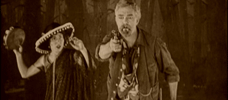
49-17
1917 -
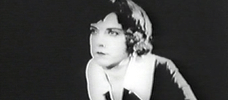
The Gun Woman
1918 -
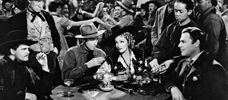
Destry Rides Again
1939 -
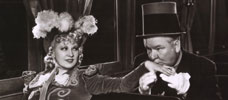
My Little Chickadee
1940 -
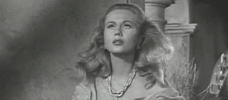
Colorado Territory
1949 -
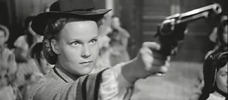
Westward the Women
1951 -
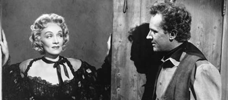
Rancho Notorious
1952 -
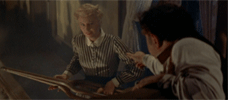
The Violent Men
1955 -
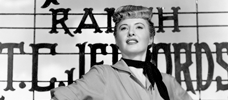
The Furies
1950 -
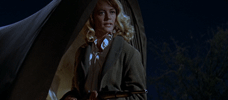
The Last Sunset
1961 -
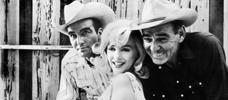
The Misfits
1961 -
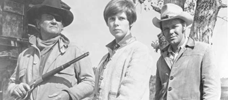
True Grit
1969 -
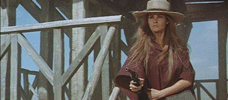
Hannie Caulder
1971 -
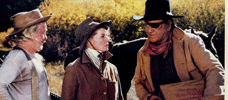
Rooster Cogburn
1975 -
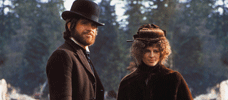
McCabe & Mrs. Miller
1971 -
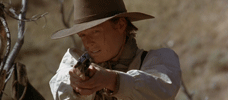
The Ballad of Little Jo
1993 -

The Quick and the Dead
1995 -
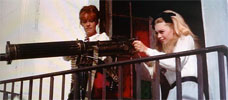
Viva Maria!
1965 -
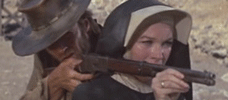
Two Mules for Sister Sara
1970
We don’t do comments anymore, but you may contact us here or find us on Twitter or Facebook.



